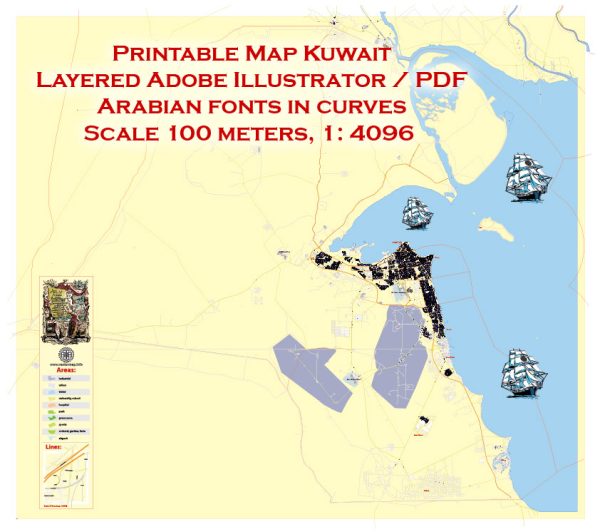Kuwait is a small country located in the northeastern part of the Arabian Peninsula in Western Asia. Vectormap.Net provide you with the most accurate and up-to-date vector maps in Adobe Illustrator, PDF and other formats, designed for editing and printing. Please read the vector map descriptions carefully. Here is a detailed description of Kuwait:
- Geography:
- Location: Kuwait is situated at the tip of the Persian Gulf, bordered by Iraq to the north and northwest and Saudi Arabia to the south.
- Area: The total land area is approximately 17,818 square kilometers (6,880 square miles).
- Capital and Major Cities:
- Capital: Kuwait City is the capital and largest city of Kuwait, located on the country’s east coast.
- Population:
- Kuwait’s population is around 4 million people. Please note that population figures may have changed.
- Language:
- The official language is Arabic.
- Government:
- Kuwait is a constitutional emirate with a parliamentary system of government. The ruling Al Sabah family has been in power for centuries.
- Economy:
- Kuwait has a highly developed and prosperous economy, primarily driven by oil exports. It possesses about 6% of the world’s proven oil reserves, making oil the backbone of its economy.
- The country has made efforts to diversify its economy, with investments in finance, real estate, and various other sectors.
- Currency:
- The currency used is the Kuwaiti Dinar (KWD), which is one of the highest-valued currencies in the world.
- Climate:
- Kuwait has a desert climate with extremely hot summers and mild winters. Temperatures can soar above 50 degrees Celsius (122 degrees Fahrenheit) during the summer months.
- Culture:
- Kuwaiti culture is influenced by Islamic traditions and Bedouin customs. The society is conservative, and Islamic values play a significant role in daily life.
- Traditional music, dance, and crafts are essential aspects of Kuwaiti culture. The country also hosts various cultural festivals and events.
- Landmarks and Attractions:
- Kuwait Towers: Iconic towers in Kuwait City offering panoramic views of the city.
- The Grand Mosque: A large and architecturally stunning mosque in Kuwait City.
- Failaka Island: An island with historical significance and archaeological sites.
- Education:
- Kuwait places a strong emphasis on education. The country has several universities and educational institutions, with efforts to promote research and development.
- Infrastructure:
- Kuwait has a well-developed infrastructure, with modern roads, airports, and seaports. The country has invested in various projects to enhance its infrastructure further.
- Social Structure:
- Kuwait has a tribal society, and familial ties are significant. The country has undergone significant social changes, with a balance between traditional values and modernization.
- History:
- Kuwait has a rich history, with ancient roots as a trading hub. It became a British protectorate in the early 20th century before gaining independence in 1961.
- International Relations:
- Kuwait maintains diplomatic relations with numerous countries and plays an active role in regional and international organizations.


 Author: Kirill Shrayber, Ph.D. FRGS
Author: Kirill Shrayber, Ph.D. FRGS